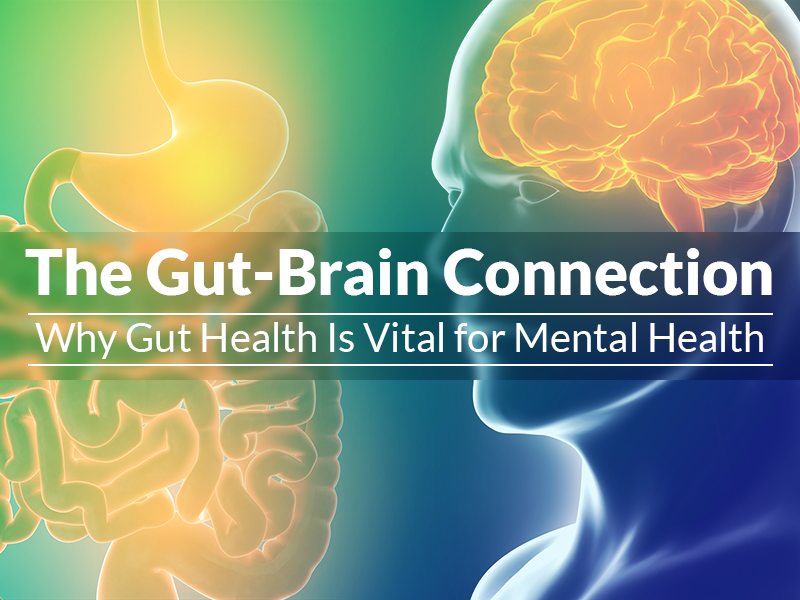Exploring the Vital Link Between Gut Health and Brain Function

Delving into Gut health and its connection to brain function, this introduction immerses readers in a unique and compelling narrative. It explores the intricate relationship between our gut and brain, shedding light on how one impacts the other in surprising ways.
As we unravel the complex web of connections between gut health and brain function, we discover a fascinating interplay that goes beyond what meets the eye.
Overview of Gut Health and Brain Function

Gut health plays a crucial role in maintaining overall well-being, as it affects various aspects of our health, including brain function. The gut, often referred to as the "second brain," is home to a complex ecosystem of bacteria that play a significant role in regulating our mental and cognitive health.
Importance of Gut Health
Having a healthy gut is essential for proper digestion, nutrient absorption, and immune function. The balance of good and bad bacteria in the gut can impact our mood, energy levels, and cognitive abilities.
Connection between Gut Health and Brain Function
- Communication Pathway: The gut and brain are connected through the gut-brain axis, a bidirectional communication pathway that involves the nervous system, immune system, and hormonal system.
- Neurotransmitter Production: The gut produces neurotransmitters like serotonin and dopamine, which are essential for regulating mood and cognitive function.
- Inflammation: Imbalances in gut bacteria can lead to inflammation, which has been linked to conditions like depression, anxiety, and cognitive decline.
Examples of How Gut Health Influences Cognitive Function
- Improved Mood: A healthy gut microbiome can help regulate mood and reduce symptoms of anxiety and depression.
- Enhanced Memory: Research suggests that gut health can impact memory and cognitive function, with a healthy gut promoting better brain performance.
- Reduced Brain Fog: Maintaining a balanced gut flora can help reduce brain fog and improve clarity of thought.
The Gut-Brain Axis
The Gut-Brain Axis refers to the bidirectional communication system between the gastrointestinal tract (the gut) and the brain. This complex network involves neural, hormonal, and immunological signaling pathways that play a crucial role in maintaining overall health and well-being.
Communication Between the Gut and Brain
The gut and brain communicate through various channels, including the vagus nerve, which runs from the brainstem to the abdomen and plays a key role in transmitting signals in both directions. Additionally, the enteric nervous system (ENS), often referred to as the "second brain," is a complex network of neurons within the gut that can operate independently of the central nervous system.
- The gut produces neurotransmitters such as serotonin, which can influence mood and behavior and are also involved in regulating gastrointestinal functions.
- Microbial metabolites produced by the gut microbiome can impact brain function and behavior by influencing neurotransmitter levels and immune responses.
- Inflammatory molecules released by the gut can trigger immune responses that may affect brain health and contribute to conditions like depression and anxiety.
The gut-brain axis plays a crucial role in regulating various physiological processes and can impact both physical and mental health.
Role of the Microbiome
The gut microbiome, which consists of trillions of microorganisms residing in the digestive tract, plays a significant role in regulating the gut-brain axis. These bacteria, fungi, and other microbes produce a wide range of metabolites that can influence brain function and behavior.
- Probiotic bacteria in the gut can help maintain a healthy balance of neurotransmitters and reduce inflammation, which may have a positive impact on mood and cognitive function.
- Dysbiosis, an imbalance in the gut microbiota, has been linked to various neurological conditions, including autism spectrum disorders and Alzheimer's disease.
- Prebiotics, which are dietary fibers that serve as food for beneficial gut bacteria, can support a healthy microbiome and promote better communication between the gut and brain.
Impact of Gut Microbiota on Brain Health

The gut microbiota plays a crucial role in influencing brain health through the gut-brain axis, a bidirectional communication system between the gut and the brain
Specific Strains of Bacteria Beneficial for Brain Health
- Lactobacillus helveticus: Produces neurotransmitters like serotonin, which can positively impact mood and cognitive function.
- Bifidobacterium longum: Helps regulate stress response and reduce anxiety-like behavior.
- Escherichia coli Nissle: Has been shown to improve intestinal barrier function and reduce inflammation, which can indirectly benefit brain health.
Link Between Gut Dysbiosis and Neurological Disorders
Gut dysbiosis, an imbalance in the gut microbiota composition, has been linked to various neurological disorders such as depression, anxiety, autism spectrum disorders, and even neurodegenerative diseases like Alzheimer's and Parkinson's. The disruption in the gut-brain axis caused by gut dysbiosis can lead to systemic inflammation, altered neurotransmitter levels, and compromised immune function, all of which can contribute to the development and progression of these neurological conditions.
Factors Influencing Gut Health and Brain Function
Maintaining a healthy gut and optimal brain function is crucial for overall well-being. Several lifestyle factors can significantly influence the health of our gut and the functioning of our brain.
Lifestyle Factors Impacting Gut Health
- Diet: A balanced diet rich in fiber, fruits, vegetables, and probiotics can promote a healthy gut microbiota. On the other hand, a diet high in processed foods, sugar, and unhealthy fats can disrupt the balance of gut bacteria.
- Physical Activity: Regular exercise has been shown to improve gut health by promoting diversity in gut microbiota. Sedentary behavior, on the other hand, can have a negative impact on gut health.
- Sleep: Getting an adequate amount of quality sleep is essential for maintaining a healthy gut-brain axis. Poor sleep patterns can lead to imbalances in gut bacteria and affect brain function.
Impact of Diet on Gut Health and Brain Function
- Nutrient Absorption: The food we eat provides essential nutrients for the gut microbiota to thrive, influencing brain function through the production of neurotransmitters.
- Inflammation: A diet high in processed foods and sugar can lead to inflammation in the gut, affecting the blood-brain barrier and potentially causing cognitive impairments.
- Gut Bacteria: Certain foods can either promote the growth of beneficial gut bacteria or disrupt the balance, impacting brain health and cognitive function.
Stress and Mental Health on the Gut-Brain Axis
- Stress Response: Chronic stress can alter the composition of gut microbiota and increase intestinal permeability, leading to inflammation and affecting brain function.
- Mental Health Disorders: Conditions like anxiety and depression have been linked to changes in gut microbiota composition, impacting neurotransmitter production and cognitive processes.
- Mind-Body Connection: The gut-brain axis plays a vital role in regulating stress responses and emotional well-being, highlighting the importance of mental health in gut health and brain function.
Closure

In conclusion, the discussion on Gut health and its connection to brain function unveils a profound correlation that underscores the significance of maintaining a healthy gut for optimal brain function. By understanding this intricate relationship, we pave the way for improved overall well-being and cognitive health.
Query Resolution
How does gut health influence brain function?
Gut health impacts brain function through the gut-brain axis, where the microbiome communicates with the brain, influencing cognitive processes.
Can specific strains of bacteria improve brain health?
Yes, certain strains of bacteria, like Bifidobacterium and Lactobacillus, have been shown to positively impact brain health by supporting cognitive function.
What lifestyle factors affect gut health?
Diet, stress levels, sleep quality, and physical activity all play a role in influencing gut health, which in turn affects brain function.
Is there a link between gut dysbiosis and neurological disorders?
Yes, disturbances in gut microbiota balance (dysbiosis) have been associated with neurological disorders like Alzheimer's and Parkinson's disease.




